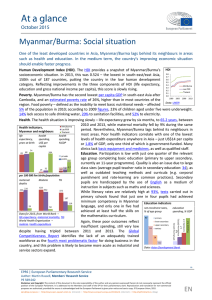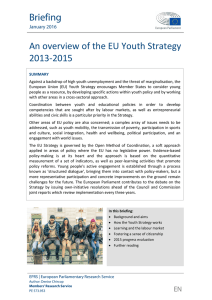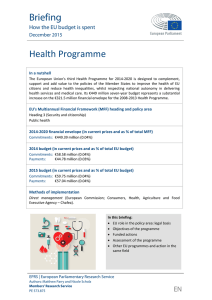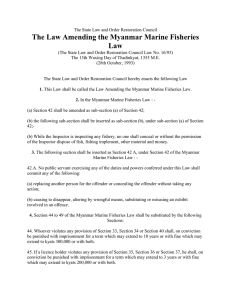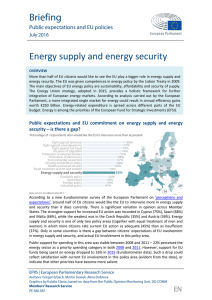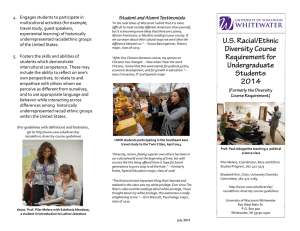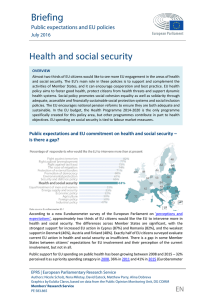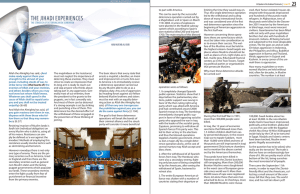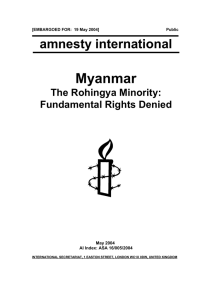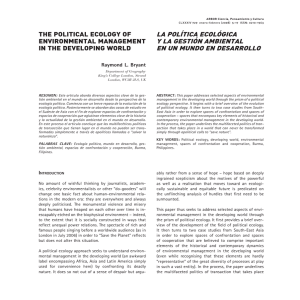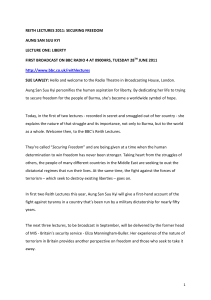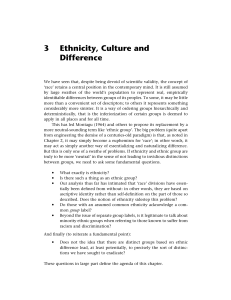Briefing European Parliamentary Research Service
Anuncio
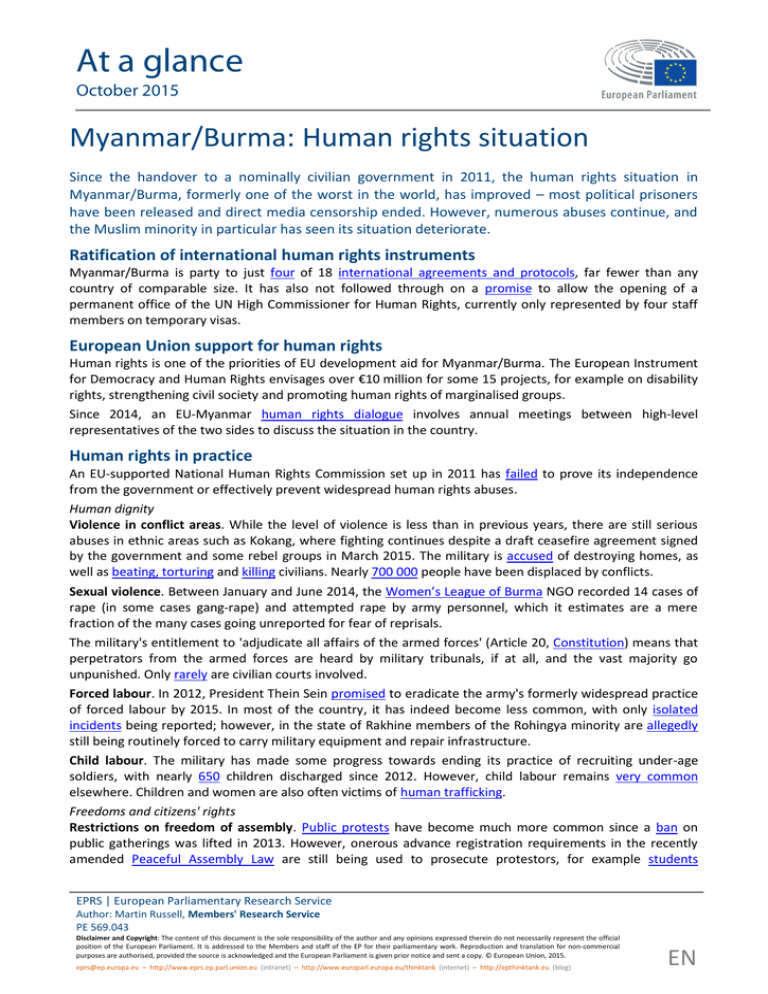
At a glance October 2015 Myanmar/Burma: Human rights situation Since the handover to a nominally civilian government in 2011, the human rights situation in Myanmar/Burma, formerly one of the worst in the world, has improved – most political prisoners have been released and direct media censorship ended. However, numerous abuses continue, and the Muslim minority in particular has seen its situation deteriorate. Ratification of international human rights instruments Myanmar/Burma is party to just four of 18 international agreements and protocols, far fewer than any country of comparable size. It has also not followed through on a promise to allow the opening of a permanent office of the UN High Commissioner for Human Rights, currently only represented by four staff members on temporary visas. European Union support for human rights Human rights is one of the priorities of EU development aid for Myanmar/Burma. The European Instrument for Democracy and Human Rights envisages over €10 million for some 15 projects, for example on disability rights, strengthening civil society and promoting human rights of marginalised groups. Since 2014, an EU-Myanmar human rights dialogue involves annual meetings between high-level representatives of the two sides to discuss the situation in the country. Human rights in practice An EU-supported National Human Rights Commission set up in 2011 has failed to prove its independence from the government or effectively prevent widespread human rights abuses. Human dignity Violence in conflict areas. While the level of violence is less than in previous years, there are still serious abuses in ethnic areas such as Kokang, where fighting continues despite a draft ceasefire agreement signed by the government and some rebel groups in March 2015. The military is accused of destroying homes, as well as beating, torturing and killing civilians. Nearly 700 000 people have been displaced by conflicts. Sexual violence. Between January and June 2014, the Women’s League of Burma NGO recorded 14 cases of rape (in some cases gang-rape) and attempted rape by army personnel, which it estimates are a mere fraction of the many cases going unreported for fear of reprisals. The military's entitlement to 'adjudicate all affairs of the armed forces' (Article 20, Constitution) means that perpetrators from the armed forces are heard by military tribunals, if at all, and the vast majority go unpunished. Only rarely are civilian courts involved. Forced labour. In 2012, President Thein Sein promised to eradicate the army's formerly widespread practice of forced labour by 2015. In most of the country, it has indeed become less common, with only isolated incidents being reported; however, in the state of Rakhine members of the Rohingya minority are allegedly still being routinely forced to carry military equipment and repair infrastructure. Child labour. The military has made some progress towards ending its practice of recruiting under-age soldiers, with nearly 650 children discharged since 2012. However, child labour remains very common elsewhere. Children and women are also often victims of human trafficking. Freedoms and citizens' rights Restrictions on freedom of assembly. Public protests have become much more common since a ban on public gatherings was lifted in 2013. However, onerous advance registration requirements in the recently amended Peaceful Assembly Law are still being used to prosecute protestors, for example students EPRS | European Parliamentary Research Service Author: Martin Russell, Members' Research Service PE 569.043 Disclaimer and Copyright: The content of this document is the sole responsibility of the author and any opinions expressed therein do not necessarily represent the official position of the European Parliament. It is addressed to the Members and staff of the EP for their parliamentary work. Reproduction and translation for non-commercial purposes are authorised, provided the source is acknowledged and the European Parliament is given prior notice and sent a copy. © European Union, 2015. [email protected] – http://www.eprs.ep.parl.union.eu (intranet) – http://www.europarl.europa.eu/thinktank (internet) – http://epthinktank.eu (blog) EN EPRS Myanmar/Burma: Human rights situation denouncing a new education bill and villagers contesting land seizures by the Letpadaung copper mine. Both protests were brutally repressed, ending in the latter case with the death of one villager and serious injuries to four more; participants face possible torture, and several years' imprisonment. Restrictions on freedom of expression. The most flagrant violation was the recent sentencing to two years' hard labour of Htin Lin Oo, an official of Aung San Suu Kyi's NLD party, for denouncing the use of Buddhism as a tool for extremism. By contrast, hate speech by Buddhist radicals, whose attacks on Muslims as rapists and 'snakes' played a part in inciting deadly anti-Muslim riots, goes unpunished. Media freedom has improved since the end of censorship in 2012, with moderate criticism of the government allowed. However, certain topics such as the role of the all-powerful military remain taboo. Five journalists were recently jailed for seven years after reporting on an alleged chemical weapons factory, while another investigating the campaign against ethnic rebels was killed in military custody. Overall, there has been a worrying increase in the number of political prisoners over the past few months – 108 in prison, 458 awaiting trial in August 2015, up from 84 and 122 respectively one year earlier, although this is still much fewer than under the military junta (over 2 000 prisoners in 2008). A recent presidential amnesty did little to help as the vast majority of those released were criminals. Land confiscation. With rising foreign investment in the country's abundant natural resources, land-grabbing looks set to remain widespread. Thousands of farmers have lost their land and livelihoods after being displaced by projects such as the Letpadaung Copper Mine or the Paunglaung Dam without receiving adequate compensation; in the country as a whole, some 700 land disputes are currently ongoing. Equality Discrimination against Muslims. The situation of Muslims (at least 4% of the population) has deteriorated, with increasingly prevalent hate speech by formerly repressed Buddhist fundamentalists. A recently adopted package of four 'Race and Religion Protection Laws' discriminates against religious minorities such as Muslims and Christians, among other things by making interfaith marriages and religious conversion subject to approval by the authorities. Discrimination is also apparent in the disqualification of disproportionate numbers of Muslim and ethnic minority candidates in the November 2015 elections. Of the country's Muslims, the most disadvantaged of all are the almost 1 million Rohingyas. Despite claiming to have lived in the country for centuries, they are officially classified as illegal 'Bengali' immigrants and are denied full citizenship. For decades they have been subject to restrictions – requiring official authorisation to get married, or travel and work outside their villages, barred from higher education and public office. In 2013, they were banned from having more than two children, and in 2015 told to surrender their temporary 'white cards', meaning that they no longer have ID documents or the right to vote. The humanitarian situation of the Rohingya is dire. Since the 2012 Rakhine riots left hundreds killed and 140 000 displaced, many have been confined to squalid camps, lacking access to adequate food, sanitation or medical care; the situation reached a new low in 2014 when humanitarian organisations were forced to pull out of the Rakhine region for several months due to attacks by Buddhist mobs. Some 25 000 fled the country in the first quarter of 2015, nearly double the number a year earlier. Those who survive the journey often fall prey to human traffickers or end up in refugee camps. Other minorities. ID documents have been confiscated not only from the Rohingyas but also from some ethnic Chinese and Indians. With memories of the 1967 anti-Chinese riots still alive and rising hostility (not least because of controversial Chinese mining and hydroelectric projects such as those mentioned above), even those with full citizenship prefer to keep a low profile. Outlook Progress towards ending ethnic conflict and an electoral victory in November 2015 for the NLD opposition party and its leader Aung San Suu Kyi, could help to improve human rights, although she has been generally reticent on issues such as the situation of the Rohingyas. Moreover, the constitutionally enshrined power of the military, perpetrator of some of the worst abuses, will remain intact regardless of the election outcome. Human rights feature in numerous EP resolutions on the country, most recently in the resolution of 23 May 2013 on Myanmar/Burma's access to generalised tariff preferences, which describes the human rights situation as 'fragile' and mentions 'arbitrary detention, forced displacement, land confiscations, the use of child soldiers, aggressive acts against ethnic minorities and a weak judiciary' as some of the main concerns. Members' Research Service Page 2 of 2
